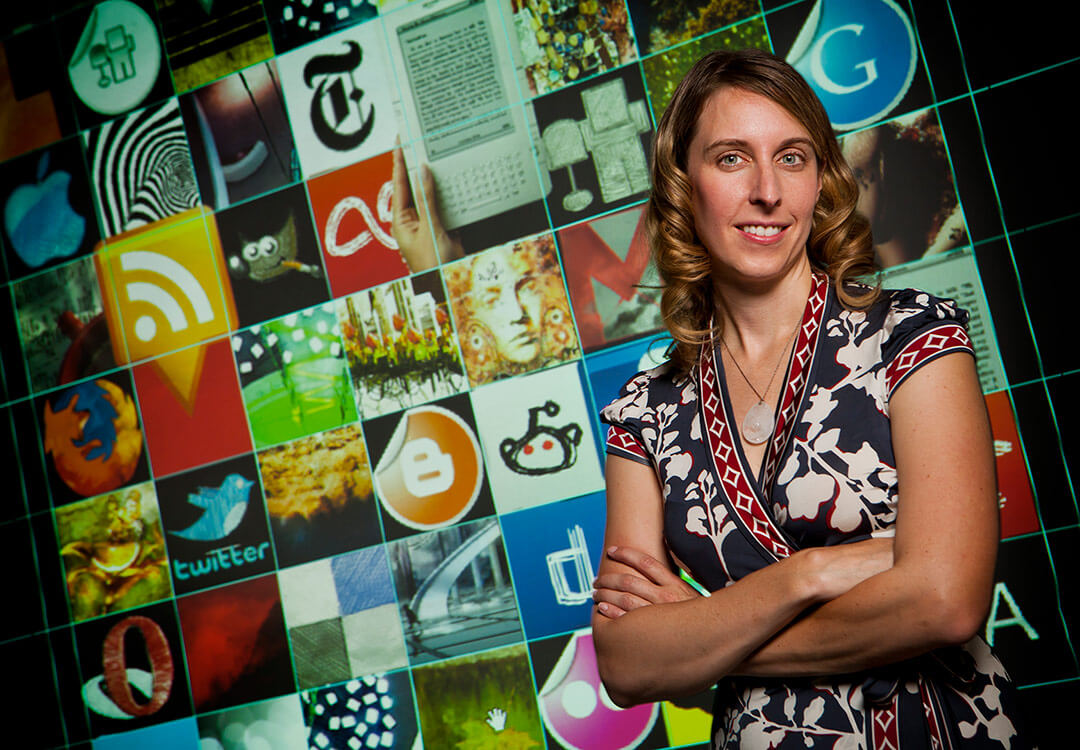- May 02, 2019
- By Chris Carroll
Lax protection of user data, livestreams of mass shootings, predicted multibillion-dollar fines—and these are just the recent Facebook scandals.
But if you think the social media behemoth is navigating tough times, think again. Following Facebook’s announcement last week that it was bracing for a fine of up to $5 billion from the Federal Trade Commission for privacy violations, the company’s stock surged.
UMD College of Information Studies Professor Jen Golbeck, a computer scientist who’s a leading researcher in the ways social media platforms operate and interface with users, spoke yesterday to Maryland Today about the internal culture that leads to Facebook’s issues.
Why the continued drumbeat of scandals?
Facebook has continuously acted like it's some guys in a garage making a startup, even though they're an organization that makes more money than a lot of countries at this point. There are all kinds of problems, like Russian interference in the election and online harassment. Some of it is things like when we saw the streaming of the New Zealand shooting—content posted there that shouldn't be.
 How does the company handle these issues?
How does the company handle these issues?
Generally they try to go backward and address how their platform has been used, instead of thinking in advance about how their platform will be used and putting some blocks in place. Instead they say, Oh, we fixed this. Oh, we've protected your data. Oh, we've put things in place to stop these bots and fake news. And then literally a month later, something new shows it hasn’t happened.
If Facebook asked you how to be proactive, what would you tell them?
No. 1 would be, assuming more of a duty to protect people's data. That means you're not making deals to give it to third parties. You're not exploiting it in the way you are now. Sure, they can use it internally to target ads to you. Some people might not like that, but Facebook using the data that you give them to make decisions internally is very different than the data privacy scandals that we've seen, all of which could have been avoided.
What other change is needed?
You need strategic people talking to them about how this platform can be misused. And part of the approach to doing that right is having a diverse group of people working on the platform. A problem at Facebook and most Silicon Valley firms is that there are not a lot of women, not a lot of people of color. If you’d had a lot of women and people of color, they could have said, “Hey, this sort of bad stuff happens to us all the time and it's going to happen on the platform.”
How much of the issue is technical, and how much is about business decisions?
It's a combination, but I think it's more of a business decision. For example, it’s hard to catch bad things happening live on Facebook, right? When the New Zealand shooting happened, Facebook took down the original video pretty fast, and they said they then removed 1.5 million copies and blocked another 1.2 million uploads. But it’s one thing for Facebook to take down the video you reposted of a mass shooting; there are other possible responses. If it were my platform and you uploaded that, I would delete your account. Facebook decided to take the smallest possible measures against people they could.
What about freedom-of-expression arguments?
Facebook has absolutely no obligation to allow free speech on their platform. It's a private company who's hosting your data, and it makes me a little crazy when people say they have a right to free speech on Facebook. Of course there's this Internet ethos toward allowing free speech and allowing content. Facebook has really struggled with what's reasonable, and what they want to support. I wouldn’t say it’s been great, but Facebook has actually done better on this—for instance with taking down revenge porn—compared to other places like Twitter.
With all the issues, why is Facebook seemingly flying high?
It’s like the market just says, yeah, that's part of the cost of doing business and Facebook is cool. They can absorb it. It seems like anything that's been done to them is not really having an impact. They have so much money that even $5 billion fines won’t really harm them. A big reason is that they have a sort of monopoly on user data. It makes it hard for people to shift away from Facebook.
Topics
ResearchUnits
College of Information